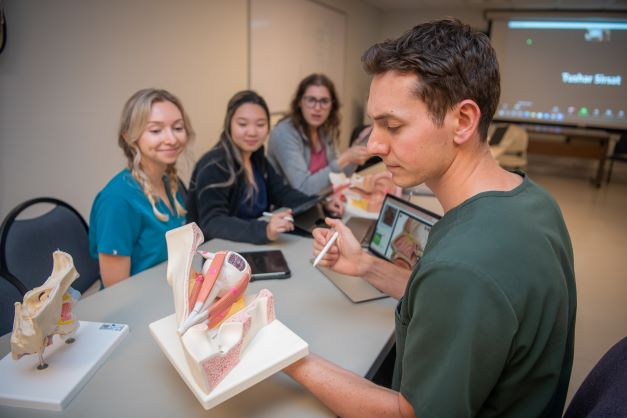A $10K grant from the Northern New York Library Network will fund a first-of-its-kind project at Clarkson University. “Reckoning with Race and Racism in Healthcare and Medicine” will be led by Professor Stephen T. Casper, PhD, Medical Historian and History Professor, and Mary K. Cabral, MLS, Health Sciences Librarian.

Research has shown ongoing evidence that racial biases determine health outcomes. There is a need for greater opportunities for intentional contemplation of these challenges by healthcare practitioners, clinical educators, and clinical students, especially outside the walls of hospitals. One way to solve this problem is to offer free training and continuing education targeted at doctors, nurses, physician assistants, physical and occupational therapists, healthcare workers and healthcare students that deal with race and racism in medicine, healthcare, and healthcare practice.
Clarkson’s Health Sciences Library, located at 59 Main Street, is part of the growing hub of healthcare expertise at the university. Clarkson has innovative healthcare programs in healthcare management, physician assistant training, bioethics, physical therapy, and occupational therapy. Many student organizations for undergraduates serve pre-med students and pre-health sciences students. Clarkson has minors in bioethics and medicine and healthcare for undergraduates interested in careers in healthcare.
“Clarkson Libraries are pleased to partner in this project, especially in fostering a positive environment where participants can learn and talk with each other about issues of social and environmental injustice, including how this may impact their own work and care of patients in this community,” Cabral said. Casper and Cabral will use the funds to create a course through the Health Sciences Library at Clarkson, and they will develop a library collection and resource guide to support it.
“Obviously it is important for our university’s educational mission to have the best books written on social and environmental determinants of health,” Casper said. “When you look at the historical legacies of segregation in America; when you look at who were on the boards of medical schools; when you look at who was experimented on in medicine; and when you look at who the doctors were, it is pretty obvious that social injustice has a lot of importance in understanding why population health outcomes look the way they do in the United States.”
Cabral and Casper have also identified several general introduction volumes that are being made available to book clubs locally. These books are available to the entire local community. Casper and Cabrel hope the books and the workshops will have a trickle-down effect in the local community.
“People need tools to think about these issues,” Casper said. “That’s why we are buying ten copies of several books. We wanted people in our community to be able to create book clubs around them and talk about what they say.”
Among the books are two by Harriet Washington: Medical Apartheid: The Dark History of Medical Experimentation on Black Americans from Colonial Times to the Present and A Terrible Thing to Waste: Environmental Racism and Its Assault on the American Mind. “These books are really compelling entry points to thinking about our healthcare now,” Casper said. Other books include Michelle Alexander’s The New Jim Crow: Mass Incarceration in the Age of Colorblindness, Robin DiAngeleo White Fragility: Why is it so hard for white people to talk about racism, Heather McGhee, The Sum of Us: What Racism Costs Everyone and How we can Prosper Together, Richard Rothstein, The Color of the Law: A Forgotten History of How Our Government Segregated America, Beverly Tatum Why Are All the Black Kids Sitting Together in the Cafeteria? And Other Conversations About Race?
Casper and Cabrel hope the project can address an educational gap that exists in the area for Northern NYS healthcare practitioners who desire training, dialogue, and conversation with like-minded professionals with their distinct challenges.
“I think a lot of people underestimate just how many of the challenges created by race and racism in medicine can help us think about other kinds of challenges rurally situated communities like those in the north country have in healthcare. You study a topic like environmental injustice created by the way urban communities segregate and you can extrapolate in meaningful and important ways to how economic injustice in rural areas leads to similar outcomes,” Casper observed.
https://www.clarkson.edu/news/clarkson-awarded-grant-help-address-racism-healthcare-and-medicine